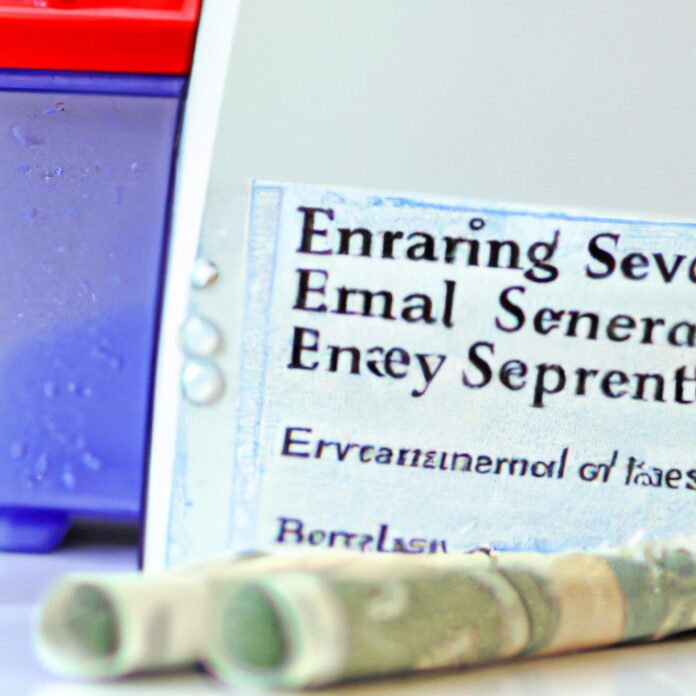Money is often one of life’s most worrisome worries. An unexpected bill or emergency expense can bring an onslaught of stress. To put your mind at ease, establishing a rainy day fund is an important step you can take to shosser financial freedom. Creating a rainy day fund isn’t only important – it can make a huge difference in your overall financial security. Read on to learn more about the importance of emergency savings and strategies to apply in creating a rainy day fund.
1. Why Bother with an Emergency Fund?
A Life-Saving Tool
An emergency fund is your financial back-up plan, ready when the unexpected strikes. It provides a protective cushion should you find yourself in a difficult financial situation, and is a far better option than simply relying on debt or dipping into your savings.
We’ve all faced sudden, costly surprises such as car repairs, medical bills or major appliance malfunctions. Without an emergency fund, these expenses often seem unmanageable. Having an easily accessible, pre-planned reserve will prevent you from racking up large credit card bills or getting into long-term debt.
Budget for Emergencies
Most financial professionals recommend having a fund with enough money to cover three to six months of your essential living expenses, such as rent or mortgage payments, utilities, food, and transportation costs. If you’re self-employed, it may be a good idea to keep enough for nine to twelve months. Here are a few steps you can take to start building your emergency fund:
- Determine Your Expenses: Write out a budget for your essential expenses to determine the total amount you need.
- Set a Goal: Estimate how long it will take to save the amount and set a timeline for yourself.
- Save Automatically: Have a portion of your paycheck deposited into a separate savings account.
- Monitor Savings: Monitor the growth of the fund over time and adjust your timeline or save addition money based on your progress.
Benefits
By having an emergency fund in place, you’ll rest easier knowing that should something go wrong, your finances are in check. You should also consider using the fund to prepare for potential job loss. By having money saved, you can focus on finding a job rather than worrying about bills.
Think of your emergency fund as an insurance policy for your finances. Having a reserve will allow you to weather any financial storms and provide essential peace of mind.
2. Establishing a Rainy Day Fund
should be the first step towards becoming financially secure. Everyone should strive to put aside a portion of their income each month for uncertain times. Doing so requires managing your finances on a regular basis.
- Start by regularly examining your budget. This helps you identify potential areas for money-saving and puts into perspective how much money you can allocate towards savings.
- Set aside a percentage of your income per month that you are comfortable contributing to your rainy day fund. Even small amounts can add up over time.
- Make sure to use a reliable bank or financial institution to put your savings aside. Be sure to keep in mind applicable interest rates as well.
When attempting to save money, be sure to plan ahead. Think about future purchases or investments you may want to make in the future and set aside money now to do so. This can also help you from going into debt.
Remember: isn’t necessarily as difficult as it may seem. With a few simple steps, you can gradually begin to save and become financially secure. The more you save, the more prepared you’ll be for the future.
3. Making the Most of Your Emergency Savings
Your emergency savings are an essential tool for financial success. It is important to make sure you take full advantage of your rainy day fund. Keep reading for 3 tips on how to make the most of your emergency savings.
- Set a Savings Goal: Start by deciding how much money you want or need to save. Create an emergency fund that is tailored to your individual needs and objectives. Your savings goal should provide a clear plan of action for the amount that you want to save and when you would like to save it. This will help you stay on track and keep tabs on your progress.
- Diversify Where Savings is Stored: It is a wise idea to diversify where you store your emergency savings. Placing some of your money in a savings account, stashing away some in a secure retirement account or placing some in an investment vehicle can help you leverage your funds. Keep in mind the associated costs of saving with different platforms, but having the right mix of saving and investing is important to make sure your money is safe but also earning a decent return.
- Prioritize Saving: After you’ve decided on your savings goals and the platforms where you’d like to store your money, begin prioritizing. Put your money in some type of saving plan that is flexible enough to accommodate increases to your savings. The goal is to be proactive and get ahead of sudden changes to your financial situation that require emergency savings.
Having the right savings plan is essential for responsible money management. Take the steps to make the most of your emergency savings and have peace of mind knowing that you and your finances are secure and ready for anything life throws your way.
4. Don’t Let a Lack of Funds Rain on Your Parade
Does a lack of funds have you feeling frustrated? You may be wanting to do something amazing, but you lack the financial resources to do so. But don’t let the lack of funds inhibit your progress—you can still make your dreams come true in the most budget-friendly way. Here are a few tips:
- Save wherever possible. Get into the habit of saving from every large or small purchase, no matter how small that amount may be. Little savings can go a long way.
- Reach out. Ask for donations and sponsorships from your family and friends. You may even be able to tap into a reserved fund or receive a perk from them.
- Explore crowdfunding options. Crowdfunding has become an important tool for raising financing for all kinds of projects. You may be surprised how many people are willing to invest in your dreams.
Using the resources available to you, create a viable timeline of your project. Set realistic goals and work hard to meet them. Have patience. It’s important to remain optimistic and to stay ahead of plan.
When you come up short, don’t rely on online loans and credit cards if you can help it. This will only add more financial pressure to your life and may cause additional financial complications in the future.
At the end of the day, it is essential that you remain positive and persistent. Don’t let the lack of funds rain on your parade. Seek advice from those who understand your plan and stick to your budget. You can make it happen!
By building a rainy day fund, you’re not just preparing for the unexpected, but ensuring your own peace of mind! Taking steps to plan ahead can save you from worry and financial strain during a crisis. So why not start building a rainy day fund today? May the storm clouds pass away quickly and leave your sunny financial horizon untouched.



